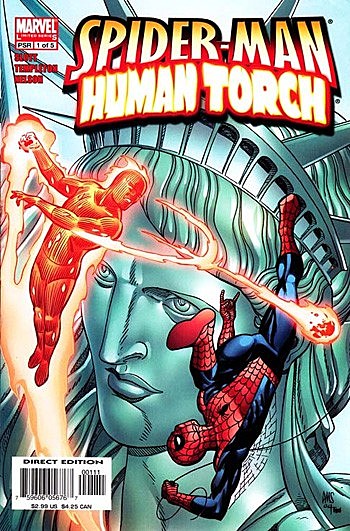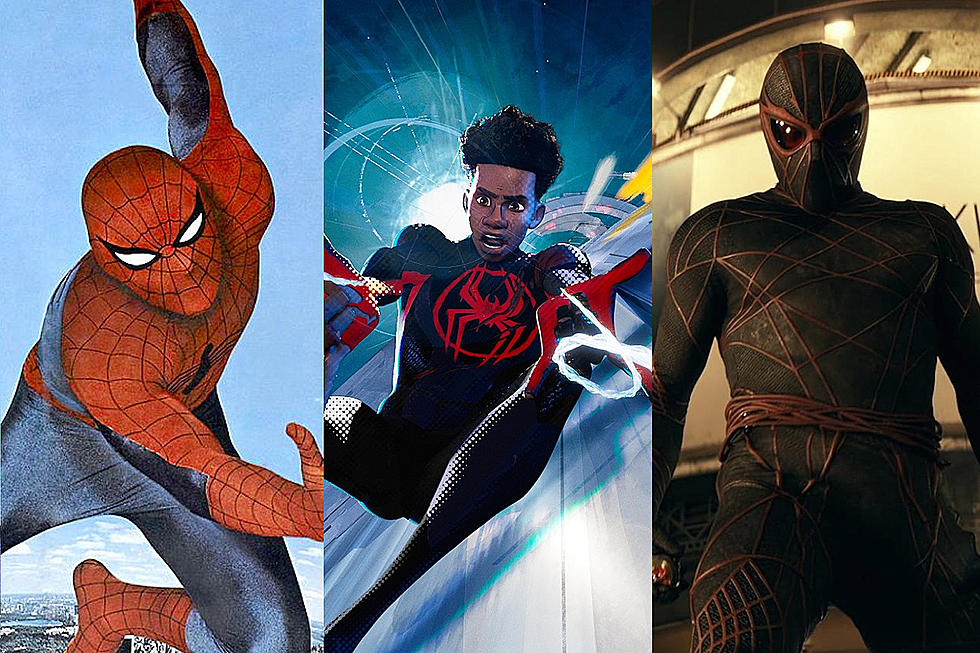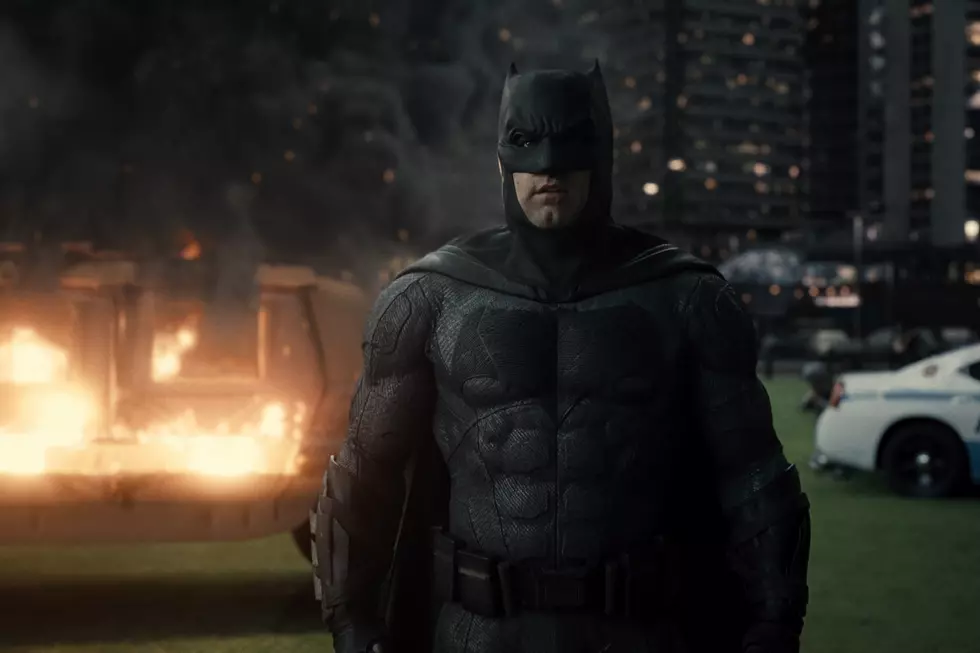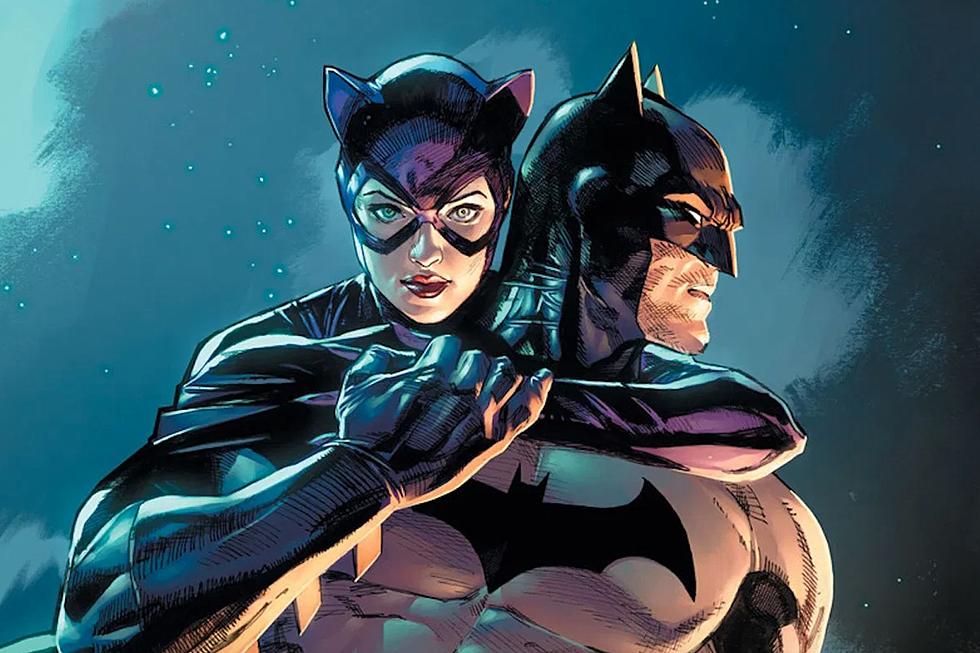
Ask Chris #14: Spider-Man’s Top 5 Underrated Stories and Books Without Pictures
Here at ComicsAlliance, we value our readership and are always open to what the masses of Internet readers have to say. That's why we've given Senior Writer Chris Sims the punishment pleasure of stepping into the grand tradition of the Answer Man as he responds to your reader questions!

Q: What are some Spider-Man stories that you would consider underrated or underappreciated? -- YGSuben
A: If you've read this column before (or talked to me for more than two or three minutes), then you probably already know that I consider myself to be the Internet's foremost Batmanologist, which mainly means that I talk about Batman pretty much all the time. What I don't often mention is how much I love my other favorite character: Spider-Man.
 I love Spider-Man. I'm actually of the mind that he's probably the best comic book character ever created, as he nails the concept of "the super-hero who could be you" better than any character that came before him, and most of the ones that emulated his success after (including Marvel's own attempt at recapturing the magic with characters like Nova, Speedball and Darkhawk). He's got great powers with a quirky twist to them -- there's that story about someone telling Stan Lee he'd never work because people hate spiders, apparently forgetting that people also generally hate bats -- and, Jimmy Olsen aside, the best supporting cast in comics.
I love Spider-Man. I'm actually of the mind that he's probably the best comic book character ever created, as he nails the concept of "the super-hero who could be you" better than any character that came before him, and most of the ones that emulated his success after (including Marvel's own attempt at recapturing the magic with characters like Nova, Speedball and Darkhawk). He's got great powers with a quirky twist to them -- there's that story about someone telling Stan Lee he'd never work because people hate spiders, apparently forgetting that people also generally hate bats -- and, Jimmy Olsen aside, the best supporting cast in comics.
But it's no secret that Spider-Man's pretty awesome, and the end result is that for the most part, the great Spider-Man stories are generally rated exactly where they should be. Things like the deaths of the Stacys, "Nothing Can Stop the Juggernaut," "Kraven's Last Hunt," "Amazing Spider-Man" #33's "The Final Chapter" (the single greatest Marvel comic ever produced), and even the short, sentimental tear-jerker that is "The Kid Who Collected Spider-Man" are all (rightly) ranked among the greats. Even recent stuff has been getting its props: Our own David Uzumeri called Zeb Wells, Chris Bachalo and Emma Rioss's "Shed" the best Spider-Man story of the decade, and if you don't think Marcos Martin's work on "Amazing" stands up to the best artists that book's ever seen, well, you're wrong.
That doesn't mean that there aren't a few truly great Spider-Man stories that have slipped through the cracks over the years, so to answer your question, I've picked out five of my favorites that could use a little more love!
For starters, one that got a lot of praise on the Internet, but unfortunately seemed to pass most people by:

Dan Slott and Ty Templeton's Spider-Man and the Human Torch. It's no secret that Slott loves Spider-Man (and pretty much the Marvel Universe in general), and over the course of five issues, he and Templeton basically create the world's most entertaining love letter to the history of the characters. Each issue takes place during a different era, playing with everything from Spider-Man's relationship with the Black Cat to the Torch's ever-inflating ego to the connection between the Spider-Mobile and the golden age of the Hostess Fruit Pie ad. Like so much stuff Slott and Templeton have done, it's pure fun distilled straight to the comics page, and while it was out of print for a few years, it was given the oversized hardcover treatment fairly recently.
 And speaking of trips through Spider-Man history, my second choice would be pretty much all of Untold Tales of Spider-Man. Primarily the product of writer Kurt Busiek and Pat Oliffe, "Untold Tales" came out during a pretty rough time in Spider-Man history, when the main titles were saddled with clones, impostors, Lady Octopi and a bunch of other stuff that rendered them all but thoroughly incomprehensible. "Untold Tales," on the other hand, was not only released at a lower price point (99 cents, compared to the then-standard price of $1.50), but was written to tell stories that fit between the early Lee/Ditko/Romita issues (an enterprising reader can actually figure out exactly where thanks to clues in the dialogue, though it's not at all necessary to enjoy the book) in one of comics' best examples of making continuity work for the story.
And speaking of trips through Spider-Man history, my second choice would be pretty much all of Untold Tales of Spider-Man. Primarily the product of writer Kurt Busiek and Pat Oliffe, "Untold Tales" came out during a pretty rough time in Spider-Man history, when the main titles were saddled with clones, impostors, Lady Octopi and a bunch of other stuff that rendered them all but thoroughly incomprehensible. "Untold Tales," on the other hand, was not only released at a lower price point (99 cents, compared to the then-standard price of $1.50), but was written to tell stories that fit between the early Lee/Ditko/Romita issues (an enterprising reader can actually figure out exactly where thanks to clues in the dialogue, though it's not at all necessary to enjoy the book) in one of comics' best examples of making continuity work for the story.
And what's more, they were really good. A couple that stick out specifically are #16's "The Boy Next Door," which follows a young Mary Jane and explores the fact that she's known Peter Parker was Spider-Man since before they met. I'd originally thought that was an invention of Busiek's, but he later left a comment on my blog about how it was actually Gerry Conway who started it in the "Parallel Lives" graphic novel. Even so, it's done so well here, and this story and her reaction at the end of the Death of Gwen Stacy are the two things that made me love Mary Jane as a character.
The other is the '96 Annual, where Busiek is joined by Mike Allred for a story where Spider-Man goes on a date with the Invisible Woman...

...only to have their pizza dinner (what do you want, he's a teenager!) interrupted by a jealous Namor. It's perfect lighthearted fun, and it also includes Aunt May's recipe for Wheatcakes. Really.
Unfortunately, there's only ever been one collection of "Untold Tales," and it doesn't include either of those issues, but they're not too hard to track down in back issue bins.
Looking back over my list, I apparently like a lot of stories that follow up on bits of Spider-Man's past, but this next one is a solid story: "Amazing Spider-Man" #271's "Whatever Happened to Crusher Hogan?" Hogan is, of course, the pro wrestler that Spider-Man fought (and pretty much humiliated) in his first appearance in order to test out his powers. Fast forward to 1985, though, and Hogan's career is over and he's working as a janitor at a boxing gym, telling everyone a very different story:

In the story, Spider-Man meets Hogan after he's been telling these stories, and it's a great moment that not only humanizes Peter Parker, it also plays to one of the strengths of the book: its rich, compelling supporting cast. It's not the only good Crusher Hogan story, either: I've talked about it before elsewhere, but the issue of "Tangled Web" that was written by Brian Azzarello and Scott Levy (a.k.a. Raven, of WWE and ECW fame) focusing on Crusher Hogan is one of the high points of that run, and probably the best comic about pro wrestling ever.
I'm not sure if this next one counts as underappreciated, as it's actually a very important story that I imagine a lot of people have read, but I very rarely hear anyone actually talk about it:

1987's Spider-Man vs. Wolverine, by Jim Owsley (now Christopher Priest) and Mark Bright (who drew the famous Batman-Throws-A-Car-Battery scene). It's one of the best-written crossovers in comics history, largely because it inverts the normal fight-then-team-up formula for super-hero meetings by -- as the title implies -- having no team-up at all. They just fight, and while there are some great funny bits to it, it goes to some pretty dark places.

So dark, in fact, that Spider-Man trying to pound Wolverine's indestructible head through a tombstone in a German graveyard isn't even close to being the most intense moment of the story. It's a great Spider-Man story, but as far as Wolverine stories go, it's up there with the original Claremont/Miller mini-series.
But again, I'm not quite sure it qualifies as underappreciated: To my knowledge, it's only been reprinted once (a Prestige Format version released in 1990), but Jeff Parker, Paul Tobin and Clayton Henry did a "What If" based on it in 2008.
Finally, a story I think is great that's probably the most obscure of the bunch:'

Brian Lynch and Sean Chen's "Slyde into Destiny," the second story from 2004's "Spider-Man Unlimited" (v.3) #1.
For those of you who don't know, Slyde is a pretty obscure Spider-Man villain to begin with, being a dude with a suit that lets him -- wait for it -- slide around, sort of like a figure skater minus the skates. In his return, Lynch and Chen use him to thoroughly lampoon the idea of the extreme reboot by bringing him back as the ludicrously over the top "newer, better, more ultimate Slyde!"

It's not a world-changing story, but it's solidly and hilariously written with a great hook to it, and is thoroughly entertaining.
There are other great, relatively obscure Spider-Man stories out there -- Darwyn Cooke and J-Bone did two issues of "Tangled Web" based around Valentine's Day and Christmas, but I don't really think I need to talk those up as they're by Darwyn Cooke and J-Bone -- but those are five solid issues that there's a good chance the average fan hasn't read.
Q: You recommend lots of comics, movies, & music, but what about prose books? What are some bookshelf gems you'd recommend? -- Doubting_Tom
A: I've always been a pretty voracious reader, but one of the downsides of reading comics for a living is that I don't get to read nearly as many prose books as I'd like. Yeah, I know, "Aw, Chris has to read Spider-Man all day. Boo hoo."
 There are plenty of books that I love, though. I've mentioned the series before, but I just finished reading "Changes," the 10th novel in Jim Butcher's "Dresden Files" series, and I think they're fantastic. I've described them as "What if Harry Potter grew up to be Philip Marlowe" and I think that about covers it, but Butcher has created a great synthesis of fantasy and private detective, and his use of language is immediately engaging and frequently hilarious. Also, I was introduced to his work by pals Caitlin Kittredge (writer of the Black London and Nocturne City novels) and Richelle Mead (writer of the Vampire Academy series), and they're not exactly slouches either.
There are plenty of books that I love, though. I've mentioned the series before, but I just finished reading "Changes," the 10th novel in Jim Butcher's "Dresden Files" series, and I think they're fantastic. I've described them as "What if Harry Potter grew up to be Philip Marlowe" and I think that about covers it, but Butcher has created a great synthesis of fantasy and private detective, and his use of language is immediately engaging and frequently hilarious. Also, I was introduced to his work by pals Caitlin Kittredge (writer of the Black London and Nocturne City novels) and Richelle Mead (writer of the Vampire Academy series), and they're not exactly slouches either.
Another good one that springs to mind is "I Love You Beth Cooper" by Larry Doyle, a former writer on "The Simpsons." It gets a little silly towards the end, but as you might expect, it's solidly entertaining, although I never saw the movie made of it. There's a comic book connection to that one, too, as it's got a cover and chapter break illustrations by "Milk and Cheese" creator and "Beasts of Burden" Writer Evan Dorkin!
 As late to the party as it makes me, I only got into P.G. Wodehouse a couple years ago when a friend bought me a big omnibus of his "Jeeves" stories as a gift, and I cannot get enough of them. Wodehouse is quite possibly the greatest humorist of the 20th century, with a deft, razor-witted writing style that's easy to imitate but impossible to duplicate. In fact, one of the major criticisms of his stories is that they're meant to be first-person accounts by the character Bertie Wooster, who is a complete and utter idiot, but they're written by someone obviously brilliant at the use of language, and when your major flaw is that you write too well, you're probably in a pretty good place. The only other drawback is that the stories are all essentially the same, but they're pulled off with such amazing skill that it hardly matters; the destination is the same but the trip is incredibly enjoyable.
As late to the party as it makes me, I only got into P.G. Wodehouse a couple years ago when a friend bought me a big omnibus of his "Jeeves" stories as a gift, and I cannot get enough of them. Wodehouse is quite possibly the greatest humorist of the 20th century, with a deft, razor-witted writing style that's easy to imitate but impossible to duplicate. In fact, one of the major criticisms of his stories is that they're meant to be first-person accounts by the character Bertie Wooster, who is a complete and utter idiot, but they're written by someone obviously brilliant at the use of language, and when your major flaw is that you write too well, you're probably in a pretty good place. The only other drawback is that the stories are all essentially the same, but they're pulled off with such amazing skill that it hardly matters; the destination is the same but the trip is incredibly enjoyable.Probably my favorite book of the last decade, though, was Sarah Vowell's "Assassination Vacation." Vowell is probably most familiar to comics fans as the voice of Violet in "The Incredibles," but she's also well-known as a contributor to Public Radio International's "This American Life," and "Vacation" is basically a feature-length version of one of her bits for the show. In it, she traces the causes, effects, and in some cases travels the literal escape routes of the Leon Czolgosz, Charles Guiteau and John Wilkes Booth, the men who assassinated Presidents McKinley, Garfield and Lincoln, respectively.
It's a pretty grim subject and she doesn't shy away from that, but she also manages to be equal parts informative, incisive and actually hilarious, too, and it re-sparked my own interest in learning more about history. If you get it, I'd recommend the audiobook version, though, not only because Vowell's work as a radio contributor and producer makes her a natural at reading, but also because it's got an all-star cast to read the quotes, including Conan O'Brien, Catherine Keener and Jon Stewart. Vowell's also got a similar book on the Pilgrims and their arrival in North America ("Wordy Shipmates") that's well worth checking out.
 Finally, I'd be remiss if I didn't mention Glen David Gold's two great novels, "Carter Beats The Devil" (based on the life of 1920s stage magician Charles Carter) and "Sunnyside" (based on film icon Charlie Chaplin).
Finally, I'd be remiss if I didn't mention Glen David Gold's two great novels, "Carter Beats The Devil" (based on the life of 1920s stage magician Charles Carter) and "Sunnyside" (based on film icon Charlie Chaplin).
They're both phenomenal books with incredibly complex plots that mix historical fact and fiction together for a reading experience that's thoroughly enjoyable and very compelling. "Carter" is one of the hardest books to put down that I've ever read, and the climax is incredibly thrilling -- Gold manages to pull off the trick of writing great sequences of escape artistry and stage magic in prose, which I can't imagine was very easy -- but for personal reasons, I prefer "Sunnyside."
Specifically page 208 in my copy (218 in the UK edition). You'll know why when you see it.
And now, a bunch of quick questions about Batman:
Q: Just for clarification, whom do you like more; Batman (anyone wearing the outfit and using the title, provided that your affection towards them is restricted to the character only when they are in costume) or Bruce Wayne (both in and out of costume)? I can probably guess, but the Internet needs this for its records. --LGCochran, via email
A: I don't dislike Dick Grayson as the current Batman, and I definitely enjoy Terry McGinnis as Batman Beyond (I do not, however, care one bit for Jean-Paul Valley), but for me, Batman is Bruce Wayne. As much as I tend to like the idea of legacy characters, I feel like Batman is so intricately tied into Bruce Wayne's story and the way it's been refined and honed over the past 70 years into something that can't be duplicated without another character.
It's something you can play around with -- again, I love "Batman Beyond" because it's basically What If Spider-Man Was Batman Too, and I could only like that idea more if you wrapped money around it before you gave it to me -- but so many elements of what make up Batman (the tragedy, the wealth, Alfred) are intricately linked with Bruce Wayne, and even a similar character doesn't have the element of being inspired the way Bruce Wayne was. They, in turn, are inspired by Bruce Wayne, and it's a big difference.
Q: Do you sleep full nights, or does your experience as a Batmanologist allow you to use Crime-Solving Microsleeps to get by? -- elwang
A: Well, I almost never get a full night's sleep, but that's less because of crime-solving microsleeps and more because I'm a freelance writer.
Q: I have a poser for you- what is Batman like as a lover? Does he change technique significantly when boffing a lass as "Bruce Wayne, billionaire playboy"? And does he cuddle? -- James, via email
A: Batman trained for 20 years to be the best at everything. EVERYTHING.
Q: I'm staring at the cover of Detective Comics #241, you know the "Rainbow Batman", and stumped like Robin, would like to know: Why? Why must Batman wear a different colored costume every night? Can you do a rundown of the issue? --Zaki Zakaria, via email
A: Ah yes: The Rainbow Batman.

It's actually pretty simple: Dick Grayson hurts his arm while pushing someone out of the way of a carload of fleeing gangsters, and since a bunch of people (gangsters included) see him hurt his arm, Batman dresses up in flamboyant, lurid, headline-making colors in order to provide an extremely garish distraction that keeps anyone from noticing that Robin's arm is also hurt, which would give away his identity.
Also, I can only assume that they included this panel...

...because they knew the Comics Internet would one day need to make some easy jokes.
That's all we've got for this week, but if you'd like to have your question answered on ComicsAlliance, tag it on twitter with "#askchris" or send us an email with "Ask Chris" in the subject line!
More From ComicsAlliance









